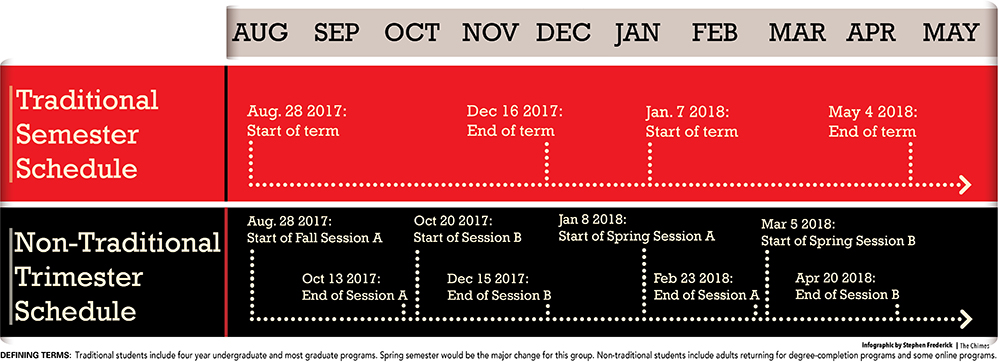As students plan for next school year, they will need to take into account new changes to the academic calendar, which change the lengths of interterm and summer as well as the placement of spring break.
Research and consideration
After two years of research and consideration, administration has decided to change Biola’s academic calendar. The changes include eliminating interterm to make a longer summer break, moving spring break to the last week of February and starting fall semester on Monday, rather than Wednesday. Their intention includes aligning the trimester and semester schedules to begin, end and break at the same time.
The trimester schedule, which is used by specialized degree-completion and some online programs, consists of seven-week sessions with a one-week break between the sessions. These sessions remain separate from the traditional semester schedules used by most undergraduate and graduate programs.
“[Trimester is a] technical term that can get confused and especially can confuse your financial aid officers,” said Patricia Pike, vice provost for academic administration. “So most of our students in the undergrad programs right now and the grad programs right now are on semester schedules and they will stay on semester schedules. We’re just moving the timing of the spring semester.”
Extended summer session
Pushing spring semester back, thus eliminating interterm, will extend summer to 15 weeks, making room for an additional full-length term. In addition to a few classes which will be offered for the full 15 weeks, two full trimesters will now fit in summer. This allows any student to attend the two seven-week classes during the summer, rather than one three-week class in January and another class in summer.
“It’s not like you’re going to be able to take any class you can take any fall [or] spring in the summer,” said Eyvette Min, assistant director of academic advising. “You probably want to think of fall and spring as your main semesters instead of thinking you can plan to do three full-time semesters.”
By having longer sessions in the summer, administration hopes to help students retain what they learn better than they would during the three-week sessions of interterm, according to Pike.
“So, say you would normally take a course in January and a course for summer session,” Pike said. “You could take both of those courses for summer session and they’d actually fit into your day and you’d actually be able to still think, which is good for learning.”
A more competetive program
By ending the spring semester earlier, Pike and Min also expect this to benefit graduating students by getting them into the job and internship markets faster, which will allow them to compete with graduates from other universities.
“It’s probably particularly exciting for students who are planning on graduating in the spring because it means that they’ll be done with their classes and they’ll be done with their degree sooner in May and then they can start looking for jobs sooner, kind of along with others graduating from other schools,” Min said.
Spring break will also move in order to align with the break between the trimester sessions. Starting next year, spring break will always fall on the eighth week of the semester, rather than the week following Easter.
“So, that will mean that things like the last day to withdraw from classes with some kind of refund will come just at that time, just around spring break. And we’ll all get time off, which is just coming at mid-term [and] will be less tiring than if we wait for Easter,” Pike said. “But we’ll still get Good Friday off, though… Can’t be a Christian school and not take Good Friday off.”
While students have concerns regarding spring semester and vacation times, administration also took into concerns from faculty and staff regarding admissions, as well as overlapping schedules.
“[If] it doesn’t align itself, then you have to have different enrollment, different registration, you have to have different admissions processes,” Pike said. “If faculty are trying to teach in both programs, then sometimes they’re only teaching one or two classes and other times they’re teaching five or six classes. Your personnel can’t do that. So it’s [a] very expensive proposition to stagger the two kinds of programs like that.”
One of the faculty’s main concerns included a loss of instructional days, especially for classes that require additional lab classes. In order to retain instructional time, the fall semester will start on Monday, rather than on a Wednesday as in previous years.
“To fit three terms in and still have things like Thanksgiving and Christmas, Good Friday and vacations like those… you tend to start squishing the semester a little bit and then the faculty lose instructional days,” Pike said. “So to get in as many instructional days as we can, we’re starting on a Monday, and that means the week before that will be orientation week.”
Because of the earlier date, new students will now move in on Thursday, and returning students will move in on Friday. Because of the loss of a day, Student Development has also eliminated the traditional beach day.
“Something had to shift and that full day that we lost [beach day] was one of the things that we had to let go of,” said Matthew Hooper, associate dean of students. “But in many ways, we’ve tried to maintain as much as possible of the events that capture kind of like the opening weekend experience and kind of [the] ethos of Biola, and I think it’ll be a great experience even with the changes.”







